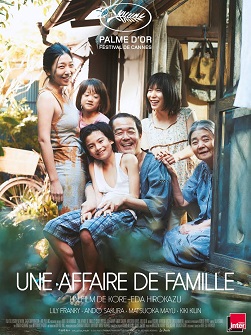“Shoplifters,” which won the latest Palme d’Or, offers a melancholic look at Japanese households.
In Japan, the family is sacred. It is, in fact, at the heart of all of Hirokazu Kore-eda’s films, evoking in him conflicting emotions. He evidently wishes to revere it, like everyone in his country, to portray it as the only haven of peace and possible happiness. He sometimes achieves this, with an insolent gaze.
What if salvation came not from those we endure, but from those we choose? “It avoids having false hopes,” the elderly lady in “Shoplifters” philosophically summarizes.
The granny is amoral, the couple living under her roof isn’t very honest, the “adopted” kid teaches his new little sister, mistreated by her real parents, the art of shoplifting from the nearby grocery store.
Life is so tough in Japan that these six outcasts have decided to face it together. Self-interest unites them, then, at least as much as tenderness. But this strange, indefinable feeling bonds them forever, making them both supportive and inseparable.
The film thus reveals the insolent perspective the filmmaker currently holds on the traditional family. To a policewoman who tells her, “All little girls want to live with their real mothers,” one of the clan members retorts, “That’s what mothers believe…”
In his own serene and cushioned way, Hirokazu Kore-eda is an anarchist.


